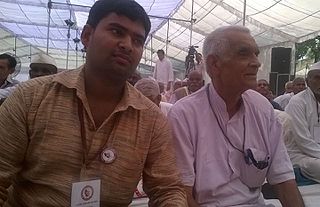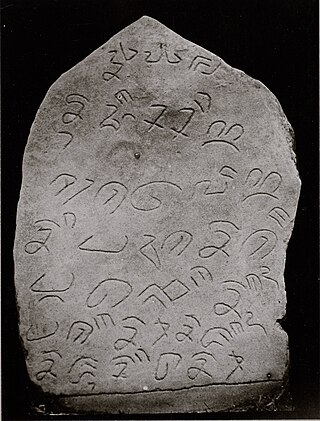Related Research Articles

Kuldeep Manak, also spelled as Kuldip Manak, was an Indian singer best known for singing a rare genre of Punjabi music, kali, also known by its plural form kalian or kaliyan. Manak is generally regarded as one of the greatest Punjabi artists of all time. His high pitched strong voice was unique, and instantly recognisable. A statue of Manak has been erected in Ludhiana near his residence as a tribute.

St. Mary's Convent Inter College, Allahabad, Uttar Pradesh, India, is a girls school run by the Sisters of the Congregation of Jesus in collaboration with a lay staff members. It was founded in 1866 by Mother Mary Ward for the education of girls. The Delhi and the Lucknow campuses are co-educational.

The Indian locomotive class WAP-4 is a class of 25 kV AC electric locomotives that was developed in 1993 by Chittaranjan Locomotive Works for Indian Railways. The model name stands for broad gauge (W), AC Current (A), Passenger traffic (P) locomotive, 4th generation (4). They entered service in late 1994. A total of 778 WAP-4 were built at CLW between 1993 and 2015, which made them the most numerous class of mainline electric passenger locomotive until the WAP-7.

The Indian locomotive class WDP-4 is a passenger-hauling diesel-electric locomotive with AC electric transmission designed by General Motors Electro-Motive Division and built by both GM-EMD and under license by Banaras Locomotive Works (BLW) of Varanasi, India for Indian Railways as the classes WDP4, WDP4B and WDP4D. The GT46PAC is a passenger version of the previous Indian Railways EMD GT46MAC freight locomotive. The locomotive has a 16-cylinder 710G3B diesel engine and is one of the fastest diesel-electric locomotives in service in Indian Railways.

Amritlal Nagar was one of the prominent Hindi writers of the twentieth century.

City Montessori School (CMS) is a co-educational English medium private school that offers education from Pre-school up to K-12 level in Lucknow, India. The school was founded in 1959 by Dr. Bharti Gandhi and Dr. Jagdish Gandhi. It is mentioned as world's largest school by Guinness Book of World Records which reported 55,547 students as of 2019.

Ramjee Singh is a former Member of Parliament and vice-chancellor of Jain Vishva Bharati University. He is an eminent Gandhian and is the author of a number of books on him. He was also the director of Gandhian Institute of Studies, Varanasi, India. In January 2020 he was awarded the fourth highest civilian award in the country: The Padma Shri for Social Work. His life has been a blend of being a Gandhian academician as well as an activist. Singh has declared Mahatma Gandhi as the Bodhisattva of the 20th century.
Manak is a residential town in the Punjab province of Pakistan. It is in Lahore District at 31°13'0N 73°12'30E with an altitude of 173 metres.
The Research Designs & Standards Organisation (RDSO) is the research and development organisation under the Ministry of Railways of the Government of India, which functions as a technical adviser and consultant to the Railway Board, the Zonal Railways, the Railway Production Units, RITES, RailTel and Ircon International in respect of design and standardization of railway equipment and problems related to railway construction, operations and maintenance.

The Subhash Nagar metro station is located on the Blue Line of the Delhi Metro.

The Indian locomotive class WDM-3A is a class of diesel–electric locomotive that was developed in 1993 by Banaras Locomotive Works (BLW), Varanasi for Indian Railways. The model name stands for broad gauge (W), Diesel (D), Mixed traffic (M) engine, with 3300 horsepower (3A). The WDM-3A is a later classification of earlier WDM-2C. They entered service in 1994. A total of 143+ were built at ALCO and Banaras Locomotive Works between 1994 and 2003 with rest of the 1246 units being rebuilt from WDM-2 which made them the most numerous class of mainline diesel locomotive until the WDG-4.
Manak Nagar railway station is a small railway station in Lucknow, Uttar Pradesh. Its code is MKG. It serves Lucknow city. The station consists of three platforms. The platforms are not well sheltered.
Daliganj Junction railway station is one of the suburban railway stations in Lucknow district, Uttar Pradesh. Its code is DAL.

Rajesh Gopinathan is the outgoing CEO and Managing Director of Tata Consultancy Services (TCS), an Indian IT services and consulting organization and one of the country's largest employers. He was elevated to the role of Chief Executive in February 2017 after serving as the Chief Financial Officer since 2013. Rajesh is one of the youngest CEOs in the Tata Group.

The Indian locomotive class WDG-3A is a class of diesel-electric locomotive that was developed in 1994 by Banaras Locomotive Works (BLW),Varanasi for Indian Railways. The model name stands for broad-gauge (W), Diesel (D), Goods traffic (G) engine, 3,100 hp (3A) locomotive. They entered service on 18 July 1995. A total of 1,164 WDG-3A units were built between 1994 and 2015 at BLW, Varanasi with a few units being produced by Diesel Loco Modernisation Works (DLMW) and Parel Workshop.

The Indian locomotive class WCG-2 is a class of 1.5 kV DC electric locomotives that was developed in the late 1960s by Research Design and Standards Organisation (RDSO) and Chittaranjan Locomotive Works (CLW) for Indian Railways. The model name stands for broad gauge (W), DC Current (C), Goods traffic (G) engine, 2nd generation (2). They entered service in February 1971. A total of 57 WCG-2 were built at CLW between 1978 and 1983, which made them the most numerous class of DC electric locomotive.
Jaspreet Singh Manak is an Indian singer-songwriter. He is known predominantly for the songs "Prada", "Suit Punjaabi", "Lehanga", "Viah" and "Boss". His single "Lehanga" has featured on the UK Asian Music Chart and also the Global YouTube weekly chart.
The WDM-2G is a class of diesel electric genset locomotive used in Indian Railways. It is one of the rarest locomotives in India with only two units being produced by Patiala Locomotive Works (PLW). The locomotives were produced with an intention of being fuel efficient and to be used for light to medium duties such as short passenger runs along with occasional shunting. They are one of the only two classes of locomotives in India to feature multiple prime movers, the other example being WDS-6G, which was designed solely for shunting. They have a rated power of 2,400 HP.

The Indian locomotive class WAP-3 was a class of 25 kV AC electric locomotives that was designed by Research Design and Standards Organization (RDSO) and Chittaranjan Locomotive Works (CLW) for Indian Railways in 1987. The model name stands for Broad gauge (W), AC Current (A), Passenger traffic (P) locomotive, 3rd generation (3). They entered service in 1988. They were the faster variant of the previous WAP-1 class. A total of 9 WAP-3 were converted from existing WAP-1 units at CLW between 1987 and 1988. All locomotives were now withdrawn from service and converted back to WAP-1.

Old Sundanese is the earliest recorded stage of the Sundanese language which is spoken in the western part of Java, Indonesia. The evidence is recorded in inscriptions from around the 12th to 14th centuries and ancient palm-leaf manuscripts from the 15th to 17th centuries AD. Old Sundanese is no longer used today, but has developed into its descendant, modern Sundanese.
References
- ↑ "RDSO Highlights—October 2016" (PDF). Research Design and Standards Organisation . Retrieved 19 May 2017.